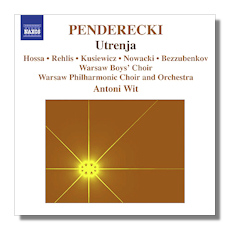
The Internet's Premier Classical Music Source
Related Links
- Penderecki Reviews
- Latest Reviews
- More Reviews
-
By Composer
-
Collections
DVD & Blu-ray
Books
Concert Reviews
Articles/Interviews
Software
Audio
Search Amazon
Recommended Links
Site News
 CD Review
CD Review
Krzysztof Penderecki

Utrenja
- Iwona Hossa, soprano
- Agnieszka Rehlis, mezzo-soprano
- Piotr Kusiewicz, tenor
- Piotr Nowacki, bass
- Gennady Bezzubenkov, basso profondo
Warsaw Boys' Choir
Warsaw Philharmonic Choir & Orchestra/Antoni Wit
Naxos 8.572031 DDD 74:51
Penderecki the devout Roman Catholic and Penderecki the avant-garde innovator come face-to-face in Utrenja, a work completed in 1971. (Initially, the work consisted of only the first part, "The Entombment of Christ," but Penderecki added "The Resurrection of Christ" a year later.) This is a demanding work, scored for orchestra and two mixed choirs, boys' choir, and several soloists. The libretto is based on Holy Saturday and Easter Sunday services in the Eastern Orthodox Church, and in addition to Old Slavonic texts, the composer sets Latin and Greek. In Utrenja, Penderecki seems eager to capture not just the mysticism and fierce beauty of the Eastern Orthodox services, but also the terror and glory of Christ's resurrection. The music at times is so powerful, and even savage, it can strike the unwary listener as more demonic than divine. Film director Stanley Kubrick recognized this; he used the beginning of "The Resurrection of Christ" in the horrific climax of The Shining. I wonder if he considered the irony!
The first part of Utrenja was dedicated, of all people, to Eugene Ormandy. Ormandy and the Philadelphia Orchestra recorded it, and the CD is available either from Japan, or in an authorized CD-R edition from arkivmusic.com. It's a well-groomed reading, but too polite. Until now, I believe, the only complete recording, dating from 1973 and conducted by Andrzej Markowski, came from Poland. It was, however, released outside of Poland by Philips. That recording was reissued on CD by Muza, the Polish label that originally released it on LP. It was a very good recording, so of course it now is out of print!
Wit's new recording fills a gap, but it doesn't eclipse Markowski's. There are sections of Utrenja in which Penderecki left rhythms, pitches, and durations of notes up to the performers. As a result, two recordings separated by 35 years hardly can be expected to sound the same. Markowski's forces jumped headfirst into the music, though, while Wit's behave as if they are intimidated by it, or trying to make apologies for it. It's as if they are performing it in the style of Penderecki in his more conservative fifties, not in his late thirties. For all I know, Penderecki may have come to Wit et al. and encouraged a less extreme performance. If he did, it was a mistake. Also, in every case, Wit's singers are less impressive. Peter Lagger, Markowski's basso profondo, for example, is a rock-solid cantor next to whom Gennady Bezzubenkov sounds lightweight and tentative.
The engineering is fine, but I have one more complaint to make: Naxos omits texts and translations, and apparently it isn't even offering them online. It is absolutely essential to understand what is being sung in this work, otherwise it runs the risk of coming across as just a series of sensationalistic sonic events. Philips' LP set contained a complete libretto, including the original texts and English translations, so I will be hanging onto it for that reason as well.
Wit's Penderecki series for Naxos largely has been a success, but this particular release has not turned out so well.
Copyright © 2009, Raymond Tuttle




















